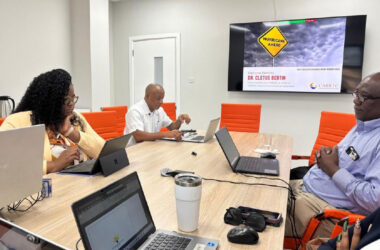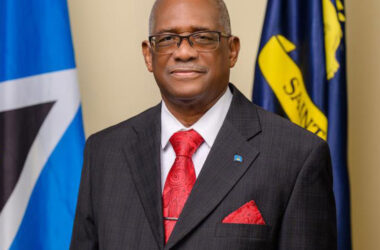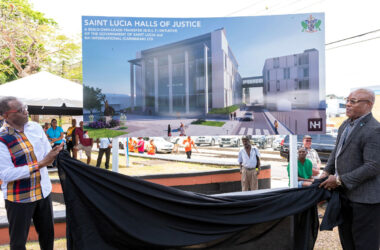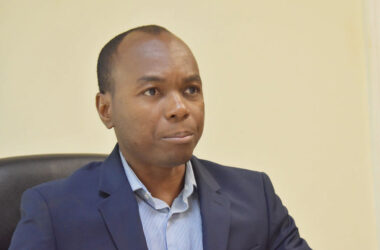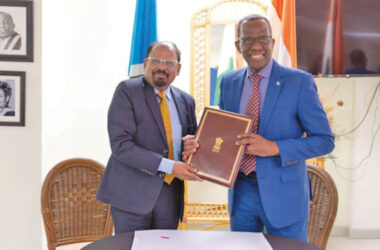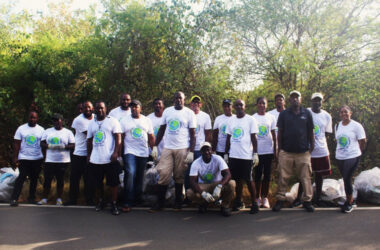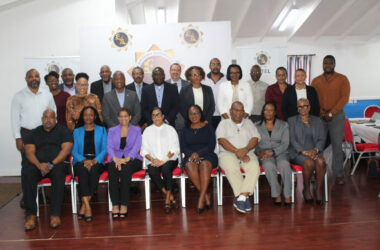Negotiators Up Momentum Ahead Of Crucial Paris Talks.
![Image: From left to right: Leon Charles, High Level Support Mechanism (HLSM) representative; Dr. Ulric Trotz, Deputy Director and Science Adviser (CCCCC); Dr. James Fletcher; and Roland Bhola, Grenada’s Minister for Agriculture, Lands, Forestry, Fisheries and Environment. [PHOTO: Stan Bishop]](https://www.thevoiceslu.com/wp-content/uploads/2015/11/Leon-Charles.jpg)
In the lead-up to the Paris many regional meetings have been held to put forward a coherent and cohesive voice and approach regarding the small island developing states (SIDS) that suffer so much from the effects of climate change even though they contribute very little to the problem.
At that Paris conference from November 30 to December 11 member states are expected to sign a binding and universal agreement on climate change. It will be the first time in over two decades of UN negotiations that such a high-level feat will be achieved.
Another round of talks was held here in Saint Lucia last week as Ministers of the Environment from CARICOM States met with climate change negotiators at Coco Palm in Rodney Bay where updated reports were presented.
Saint Lucia’s Minister for Sustainable Development, Energy, Science and Technology, Dr. James Fletcher, was among them, telling the media that the meetings were held “to decide what the main areas of concern are going into CoP 21.”
Dr. Fletcher said that in response to negotiations that took place about a week ago in Germany where a draft text was presented, last week’s meetings became necessary to review the text of those negotiations “to see whether our concerns have been reflected in the text that will form the basis of the new agreement that will be signed in Paris.”
With a few more important meetings coming up, including a CELAC meeting of Ministers of Environment and External Affairs of Latin America and the Caribbean which takes place in Ecuador, Dr. Fletcher said the United States – which usually cites economic losses as its basis for shying away from climate change agreements – has agreed on some principles.
“We have been having significant interactions with the Americans in the negotiations and also in bilateral talks with the U.S. envoy on climate change,” Dr. Fletcher said. “There are some issues on which, I think, they agree with us while there are other areas where there is significant divergence. As with all negotiations, it’s a matter of trying to arrive at some consensus.”
According to Dr. Fletcher, the Caribbean is experiencing one of the worst droughts in the last five to ten years. He added that all of the climate change modelling data indicates that between 10% and 20% reduction in water availability can be expected as a result of climate change. Sea level rise, loss and damage from the irreversible losses from bleaching of corals and ocean acidification are among other side-effects of climate change.
If signed, the Paris agreement is expected to have a huge financial impact on especially highly-industrialized countries that emit most of the globe’s greenhouse gases. Nevertheless, those pushing for the agreement to become law agree that should decisive steps not be taken presently to protect the environment, climate-related calamities would only worsen.
Among the concerns small island developing states are expected to be vociferous about in Paris in December is accessing funds to mitigate the effects of climate change. Dr. Ulric Trotz, Deputy Director and Science Adviser of the Caribbean Community Climate Change Centre (CCCCC), said the small islands developing states have been clamouring for direct access to funding for many years now, to no avail.
“Most of the climate funds basically come to us through intermediaries like the World Bank, Inter-American Development Bank (IDB) or the United Nations Development Programme (UNDP), and so on,” Dr. Trotz lamented. “We have found this approach to be quite burdensome. So we’ve asked for direct access where we can get those funds directly from the Green Climate Fund.”
At the heart of the small island developing states’ argument for the agreement expected to be signed in Paris is to keep global temperature increase below 1.5 degrees Celsius above pre-industrial levels by the year 2100. According to Dr. Fletcher, small island developing states will fight tooth and nail to ensure that their concerns are taken seriously.
“Our goal really is to ensure that these issues are not lost in the negotiations and that our issues are not subservient to those of others. (We want) the international community to continue to understand that whereas for some countries climate change is about numbers and figures, for us it’s about life and death,” Dr. Fletcher said.


![Image: From left to right: Leon Charles, High Level Support Mechanism (HLSM) representative; Dr. Ulric Trotz, Deputy Director and Science Adviser (CCCCC); Dr. James Fletcher; and Roland Bhola, Grenada’s Minister for Agriculture, Lands, Forestry, Fisheries and Environment. [PHOTO: Stan Bishop]](https://thevoiceslu.com/wp-content/uploads/2015/11/Leon-Charles.jpg)


